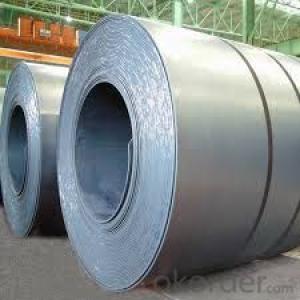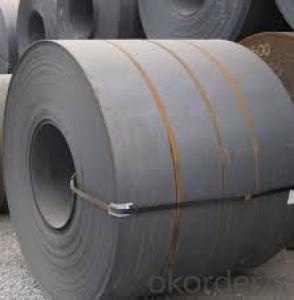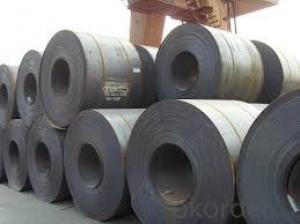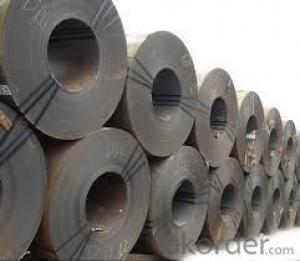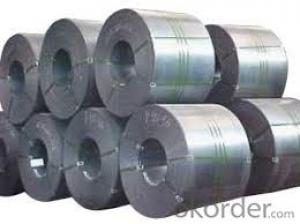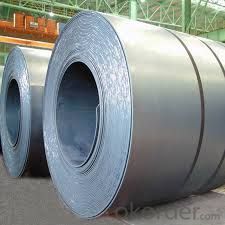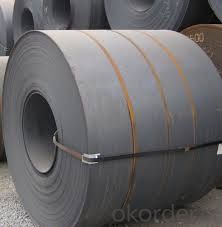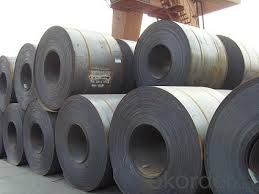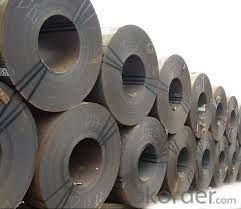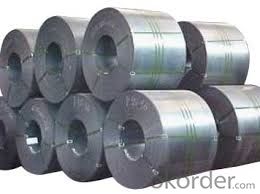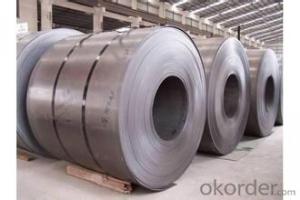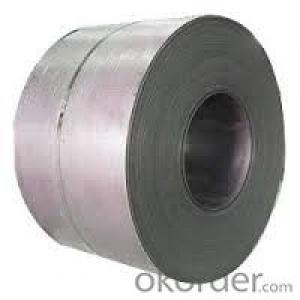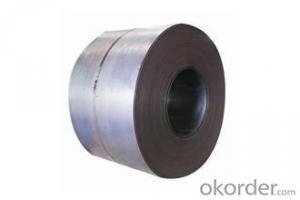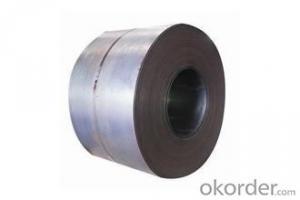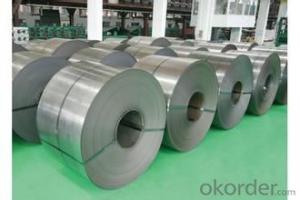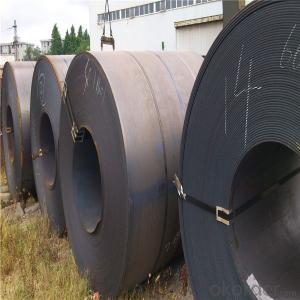Hot Steel Coil/Sheet/Strip/Sheet /Steel - G3131-SPHC
- Loading Port:
- China main port
- Payment Terms:
- TT OR LC
- Min Order Qty:
- 30 m.t.
- Supply Capability:
- 500000 m.t./month
OKorder Service Pledge
OKorder Financial Service
You Might Also Like
Hot Rolled Stainless Steel Coil 304 Annealing and Pickling No.1 Finish
Stainless steel is a production which not easy rust,acid resistance and corrosion resistance,so it is widely
used in light industry,heavy industry,daily necessities and the decoration industry.
Hot Rolled Stainless Steel Coil 304 Physical Properties
Tensile strength σb (MPa) ≥ 520
the conditions yield strength σ0.2 (MPa) ≥ 205,
elongation δ5 (%) ≥ 40
Reduction of ψ (%) ≥ 50,
hardness: ≤ 187
HB; ≤ 90
HRB; ≤ 200H
We can ensure that stable quality standards are maintained, strictly meeting both market requirements and customers’ expectations. Our products enjoy an excellent reputation and have been exported to Europe, South-America, the Middle-East, Southeast-Asia, Africa and Russia etc.. We sincerely hope to establish good and long-term business relationship with your esteemed company.
Our Hot-Rolled Steel Sheets and Coils are applied to a wide range of uses such as automobile, electrical appliance, machinery manufacturing, container manufacturing, shipbuilding, bridge, pipeline, and receive high acclaim from our customers for its excellent quality.
- Q: What is the shear modulus of steel and silver? Please help! and state where you got it from...what site did you used? Thanks.
- Shear Modulus Of Steel
- Q: How are steel coils used in the manufacturing of lighting fixtures?
- Steel coils are used in the manufacturing of lighting fixtures primarily for their structural strength and durability. The steel coils are shaped and formed into various components such as brackets, frames, and housings that provide stability and support for the lighting fixtures. Additionally, the steel coils are often coated or plated to enhance their aesthetic appeal and protect against corrosion.
- Q: The stainless steel drinking fountain had a little acid on it and rusted. I need to restore it. Is this possible?
- Nope, stainless steel is actually coated steel that can be removed by acid or scrubbing too much. it would need to be re dipped to go back to normal. would cost a fortune however.
- Q: i wanna buy a sharp carbon steel sword the swords i want are a 200 layer carbon steel katana or a hand forged high carbon steel katanna or a hand sharpened sword which one would be sharper/stronger
- Carbon steel is a generic term. There are many different grades of carbon steel consisting of several different components of various amounts, and there are different types of treatment the steel can go through that changes it's quality. Carbon steel swords are a step up from the crappy stainless steel swords, and other alloys. Sword quality completely depends on the smith. 200 layers doesn't mean there won't be any imperfections. Sword makers make mistakes, especially the lesser experienced ones. Look into the maker(s) of the sword you're looking to buy. Find information on them before deciding. Carbon steel is the steel to have, but that doesn't exclude good or bad quality. Sharpness will depend on the the steel and the smith.
- Q: I know of the cheaper steel shot for waterfoul hunting, but there is more expensive shot available. Is it worth the money, how much more distance are we talking, and what do you like the best?(brand name)
- In my experience with steel shot, I found that the higher quality stuff usually just patterns more consistently. Although I prefer Federal, any of the other major manufactuers are also great.
- Q: What's the best material for color coated steel coil?
- The base material of color coated coil is mainly galvanized steel or galvanized alloy steel plate.
- Q: Can steel coils be coated with scratch-resistant materials?
- Yes, steel coils can be coated with scratch-resistant materials. These materials are designed to provide an additional layer of protection to the steel surface, minimizing the risk of scratches or damage during handling, transportation, or storage.
- Q: I am planning to buy a Walther P22. I have liked the Pistol's performance-superb.The only confusion that I have is about the Polymer Frame.Just for this I may shift to someother manufacturer.Are Polymer Frames better than Steel in durability and lifespan.Walther says YES.Any comments on this...Practical users...Thanks in advance
- On okorder under the Walther section. I know the P22 will hold up well with normal maintenance for 5000 rounds. I can't tell you from practical experience if it will still be great at 10000 since mine hasn't gotten that far yet.
- Q: tinplate,hot rolled coil,hot rolled sheet,cold rolled coil,cold rolled sheet,d bar,wire rod,triangle,structural steel,steel pipe,steel tube,carbon steel pipe
- Here are the top 30 steel producing companies in the world, listed by the megaton output: 1. 63.0 Mton Mittal Steel Company NV (Global) [2] 2. 46.7 Mton Arcelor (Europe) [3] 3. 32.0 Mton Nippon Steel (Japan) [4] 4. 30.5 Mton POSCO (South Korea) [5] 5. 29.9 Mton JFE (Japan) [6] 6. 23.8 Mton Shanghai Baosteel Group Corporation (China) 7. 19.3 Mton United States Steel Corporation (United States) 8. 18.4 Mton Nucor Corporation (United States) 9. 18.2 Mton Corus Group (Europe) [7] 10. 17.5 Mton Riva Group (Europe) [8] 11. 16.5 Mton ThyssenKrupp (Europe) [9] 12. 16.1 Mton Tangshan (China) 13. 13.9 Mton EvrazHolding (Russia) 14. 13.7 Mton Gerdau (Brazil) 15. 13.6 Mton Severstal (Russia) 16. 13.5 Mton Sumitomo Metal Industries (Japan) 17. 13.4 Mton SAIL (India) 18. 12.0 Mton Wuhan Iron and Steel (China) 19. 11.9 Mton Anshan (China) 20. 11.4 Mton Magnitogorsk (Russia) 21. 10.5 Mton Jiangsu Shagang (China) 22. 10.5 Mton Shougang (China) 23. 10.4 Mton Jinan (China) 24. 10.3 Mton Laiwu (China) 25. 10.3 Mton China Steel (Taiwan) [10] 26. 9.6 Mton Maanshan 27. 9.4 Mton Imidro 28. 8.7 Mton Techint 29. 8.7 Mton Usiminas (Brazil) 30. 8.5 Mton Novolipetsk (Russia)
- Q: How are steel coils used in the production of pipes and tubes?
- Steel coils are an essential component in the production of pipes and tubes. They are used as the raw material to create the cylindrical shape of the pipes and tubes. The coils are unrolled and fed into a machine called a pipe or tube mill, where they undergo a series of manufacturing processes. First, the steel coils are unwound and straightened to remove any bends or twists. Then, the edges of the coils are trimmed to ensure they are smooth and even. This process is known as slitting. Next, the coils are passed through a forming machine, where they are bent into the desired shape. For pipes, the coils are bent into a circular shape, while for tubes, they can be formed into various shapes, including square, rectangular, or oval. Once the coils have been formed, they are welded together along the length to create a continuous pipe or tube. This welding process can be done using various techniques, such as high-frequency induction welding, electric resistance welding, or submerged arc welding. After the welding is complete, the pipes or tubes may undergo additional processes to improve their properties. These processes can include heat treatment, such as annealing or quenching, to enhance their strength or hardness. Finally, the pipes or tubes are cut to the desired length and may undergo further finishing processes, such as straightening, polishing, or coating, depending on their intended application. In summary, steel coils are used in the production of pipes and tubes as the starting material. They are unrolled, straightened, and formed into the desired shape before being welded together to create a continuous pipe or tube. These products can then undergo various additional processes to improve their properties and meet specific requirements.
Send your message to us
Hot Steel Coil/Sheet/Strip/Sheet /Steel - G3131-SPHC
- Loading Port:
- China main port
- Payment Terms:
- TT OR LC
- Min Order Qty:
- 30 m.t.
- Supply Capability:
- 500000 m.t./month
OKorder Service Pledge
OKorder Financial Service
Similar products
Hot products
Hot Searches
Related keywords
